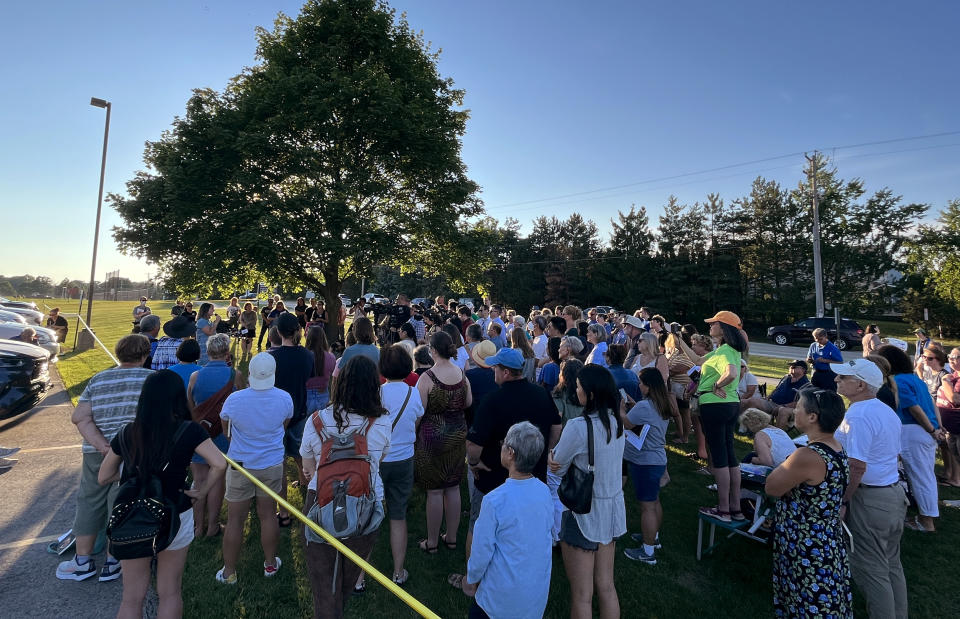Advocates rally to promote a book on Japanese American incarceration that a school board isn't including in class
- Oops!Something went wrong.Please try again later.
After a school board committee in Wisconsin decided against including a novel about Japanese American incarceration during World War II in its curriculum, more than 100 demonstrators rallied Monday in support of the book.
Local community members, organizers and educators gathered for a “teach-in,” just before the Muskego-Norway School Board meeting, to protest a committee’s decision last month not to include the novel “When the Emperor Was Divine” in an English literature class. Speakers also discussed the book’s subject matter, sharing details about the events surrounding the unjust imprisonment of 120,000 people of Japanese descent during World War II.
“Asian Americans are invisible to so many people. Our history has been really erased from so many curricula,” Kabby Hong, an Asian American and a 2022 Wisconsin Teacher of the Year who spoke at the event, told NBC Asian America. “We thought that instead of a traditional protest, what we wanted was for it to be a teach-in so that we can help educate and also share our stories.”

School board President Christopher Buckmaster did not return NBC News’ request for comment.
More than 100 people, including locals and Asian Americans from surrounding areas, attended the event spearheaded by the Asian American Pacific Islander Coalition of Wisconsin. Organizers also distributed free copies of the novel, written by Julie Otsuka, which Hong said were all taken by the end of the event. Among the most powerful moments of the event, Hong added, was a speech delivered by Ron Kuramoto, president of the Wisconsin chapter of the nonprofit Japanese American Citizens League.
“Ron shared a very moving story about his own family, being housed in horse stables, and how that just still resonates with him today,” Hong said. “It’s different when you hear history through someone’s lived experiences.”
The teach-in comes weeks after the board’s educational services committee, made up of three members who approve educational materials before they’re purchased by the full board, decided against moving forward with Otsuka’s novel.
Parent Ann Zielke previously told NBC News she had reached out to two board members for the reason. She said she was eventually told that adding the book — alongside the class’s existing inclusion of “Farewell to Manzanar,” a separate memoir about Japanese American incarceration during WWII — to the curriculum created an “unbalanced” account of history and that they would need perspective from the U.S. government.

Buckmaster previously said in a statement that the book was brought to the committee but was never moved forward to the full board. He also wrote that “at no point was this book banned or denied by the committee of the board or the full board.”
“Rather, district staff recommended that it be sent through the staff committee process again,” he wrote.
Zielke maintains that board members were clear in both private and public conversations about their disapproval of the novel and made no indication that the book would undergo another review.
Kuramoto said among his main objectives for speaking at Monday’s event was to emphasize that diverse perspectives have the power to enrich students’ educational experiences. If readers dig further, he said, they would see that the official “perspective” of the U.S. government is that the imprisonment of Japanese Americans during WWII, in hindsight, was a grave mistake. And in 1987, then-President Ronald Reagan signed the Civil Liberties Act of 1987 and issued a formal apology.
Going forward, Hong said organizers and community members will continue advocating for the book. They expect to host a virtual event with Otsuka later this year. And dozens of community members expressed interest in forming a book club, with the novel being the first up for discussion. Regardless of what the board decides, Hong said, people deserve access to the book.
“For some kids, [books] serve as a window that they can look out into the lived experiences and lives of someone that is very different from them,” Hong said. “It allows kids to develop a sense of empathy for others. And when I look out into the world that we see today, I think we need more empathy.”

